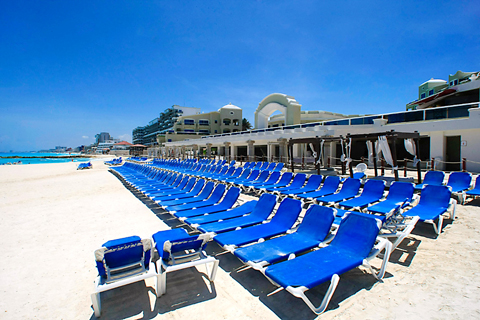Volatility unleashed by the global economic crisis and the swine flu epidemic is hitting the travel industry hard, prompting deep concern among participants at a world tourism conference that opened in Brazil on Friday.
International tourism risks sliding heavily if the H1N1 swine flu spread is upgraded to a pandemic, Said John Walker, an economist at the UK’s Oxford Economics firm.
The number of passengers could drop “up to 60 percent,” he said.

PHOTO: AFP
“The probability of a full blown pandemic is relatively low, but there might be another outbreak in full force of swine flu in the next winter in the northern hemisphere,” Walker said.
The economic crisis, meanwhile, could be more devastating to the sector in the US and Europe than expected, some participants said.
Latin America, host for the first time to the tourism conference organized by the World Travel and Tourism Council (WTTC), seemed to be sheltered from the worst of the crisis, however.
Over the first two months of this year, the number of travelers in the world has decreased 7.7 percent compared with the same period last year, according to the World Tourism Organization. That was worse than the body’s forecast of a 2 percent drop.
“We are unable to see ahead. If we finish the year with a drop of less than 5 percent we can say we held up OK,” said Geoffrey Lipman, the group’s under secretary-general.
Projections were further clouded by the added impact of swine flu, he said.
“Who can say whether one tourist or another has canceled a trip because of fears of the flu, or because he couldn’t pay household expenses,” Lipman asked.
One point is certain: Mexico has borne the brunt of the effects of the H1N1 virus. Near-empty hotels in the tourist beach resort of Cancun have been forced to offer three years of free vacations to any tourist who might become infected by the disease while staying there.
“Right now it looks like a relatively benign epidemic. There was no very violent spread like happened with SARS” in 2003, WTTC head Jean-Claude Baumgarten said.
But he added that he remained cautious in relation to tourism, because anxieties sparked by the flu virus were dampening travel.
The abandonment of Mexico by tourists could prove a boon to Brazil, however. The nation of samba is the second-biggest tourist destination in Latin America with 5.2 million visitors last year.
“Some tourists used to going to Cancun are now going to Salvador de Bahia on Brazil’s Atlantic coast,” said Gisela Mendonga, communications director for Embratur, Brazil’s tourist promotion agency.
Most of Latin America, like Africa, has mostly been spared the drop in tourism seen elsewhere. Overall, the region saw tourist numbers swell by between 3 percent and 5 percent in January and February, the World Tourism Organization said.
Brazilian President Luiz Inacio Lula da Silva, who inaugurated the world tourism conference late on Thursday, urged tourism chiefs to invest in his country, which he said was a haven of “economic stability” while the rest of the globe was suffering.
But so far, actors in the sector are playing wait-and-see. Financial transactions “have almost stalled — everybody is waiting for the crisis to pass,” complained a banker specializing in mergers and acquisitions in the tourism business.

SECURITY: As China is ‘reshaping’ Hong Kong’s population, Taiwan must raise the eligibility threshold for applications from Hong Kongers, Chiu Chui-cheng said When Hong Kong and Macau citizens apply for residency in Taiwan, it would be under a new category that includes a “national security observation period,” Mainland Affairs Council (MAC) Minister Chiu Chui-cheng (邱垂正) said yesterday. President William Lai (賴清德) on March 13 announced 17 strategies to counter China’s aggression toward Taiwan, including incorporating national security considerations into the review process for residency applications from Hong Kong and Macau citizens. The situation in Hong Kong is constantly changing, Chiu said to media yesterday on the sidelines of the Taipei Technology Run hosted by the Taipei Neihu Technology Park Development Association. With

CARROT AND STICK: While unrelenting in its military threats, China attracted nearly 40,000 Taiwanese to over 400 business events last year Nearly 40,000 Taiwanese last year joined industry events in China, such as conferences and trade fairs, supported by the Chinese government, a study showed yesterday, as Beijing ramps up a charm offensive toward Taipei alongside military pressure. China has long taken a carrot-and-stick approach to Taiwan, threatening it with the prospect of military action while reaching out to those it believes are amenable to Beijing’s point of view. Taiwanese security officials are wary of what they see as Beijing’s influence campaigns to sway public opinion after Taipei and Beijing gradually resumed travel links halted by the COVID-19 pandemic, but the scale of

A US Marine Corps regiment equipped with Naval Strike Missiles (NSM) is set to participate in the upcoming Balikatan 25 exercise in the Luzon Strait, marking the system’s first-ever deployment in the Philippines. US and Philippine officials have separately confirmed that the Navy Marine Expeditionary Ship Interdiction System (NMESIS) — the mobile launch platform for the Naval Strike Missile — would take part in the joint exercise. The missiles are being deployed to “a strategic first island chain chokepoint” in the waters between Taiwan proper and the Philippines, US-based Naval News reported. “The Luzon Strait and Bashi Channel represent a critical access

Pope Francis is be laid to rest on Saturday after lying in state for three days in St Peter’s Basilica, where the faithful are expected to flock to pay their respects to history’s first Latin American pontiff. The cardinals met yesterday in the Vatican’s synod hall to chart the next steps before a conclave begins to choose Francis’ successor, as condolences poured in from around the world. According to current norms, the conclave must begin between May 5 and 10. The cardinals set the funeral for Saturday at 10am in St Peter’s Square, to be celebrated by the dean of the College